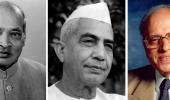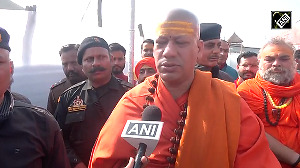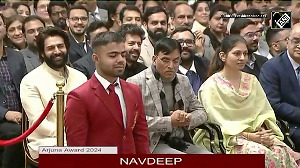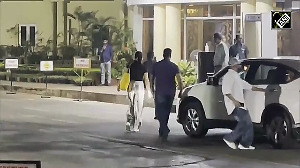Agriculture scientist M S Swaminathan's research as a plant geneticist addressed the issue of food insecurity and helped small farmers augment their income by enhancing productivity.

He dedicated his entire life to improving agriculture and the income of farmers.
Prime Minister Narendra Modi on Friday announced that the Bharat Ratna would be conferred on M S Swaminathan in recognition of his monumental contributions to the nation in agriculture and farmers' welfare.
"He was motivated more by the results of what he did on the ground and the people's love and affection," his daughter and former Chief Scientist and former Deputy Director General, WHO, Dr Soumya Swaminathan said about his work and dedication.
Over the years, his contribution made the country that once depended on American wheat to feed its people in the 1960s, transform into a foodgrain surplus nation.
Fondly addressed as MS by his friends and colleagues, Mankombu Sambasivan Swaminathan, in his long career demonstrated what he advocated -- developing new varieties for food security -- and ensured bumper crops by working side by side with farmers.
Born in Kumbakonam in Tamil Nadu on August 7, 1925 to Dr M K Sambasivan and Parvati Thangammai, Swaminathan played a significant role in changing the trajectory of the agriculture sector when farmers were dependent on archaic farming techniques.
He began his research career with cytogenetic studies on potato in 1949 at the Agricultural University, Wageningen, the Netherlands, and later at Cambridge University, where he obtained his PhD in Genetics in 1952, according to an article in Current Science (Living legends in Indian science).
His noteworthy contribution to cytogenetics and breeding of potato, led to his appointment in the Central Rice Research Institute (CRRI-Cuttack) to work in the indica-japonica rice hybridisation programme to develop fertiliser-responsive varieties of rice suitable for the rice growing tracts in India.
In later years, he would reminisce that the indica-japonica hybridisation programme at CRRI was indeed the early harbinger of the Green Revolution movement in India. The work resulted in varieties like ADT27 and RASI cultivated in Tamil Nadu.
MS had written that seeds of the green revolution were first sown in the fields of CRRI through the indica-japonica rice crosses, and decided that the plant type should be tailored to be functionally responsive to external application of fertilisers.
In 1988, he founded the M S Swaminathan Research Foundation (MSSRF) a not-for-profit trust, with the proceeds of the first World Food Prize he received in 1987. It is dedicated to "accelerate the use of modern science for sustainable agricultural and rural development."
He handled many official roles, including that of the chairman of the National Commission on Farmers, and President of the Pugwash Conferences on Science and World Affairs. He held a string of positions including that of Director of the Indian Agricultural Research Institute (1961-72) and Director General of Indian Council of Agricultural Research and Secretary to the Government of India, Department of Agricultural Research and Education (1972-79).
He was awarded the World Food Prize for developing and spearheading the introduction of high-yielding wheat and rice varieties in India during the 1960s when the country faced the prospect of widespread famine.
Swaminathan, a former Rajya Sabha member (2007-13), received 84 honorary doctorate degrees from universities around the world. He spent two decades in research and administrative positions at agricultural institutes.
"So, he always used to remember the farmers that he met. Wherever he went in India, farmers would come and meet him and convey their gratitude," Soumya said.
Swaminathan died on September 28, 2023. He was 98.








 © 2025
© 2025